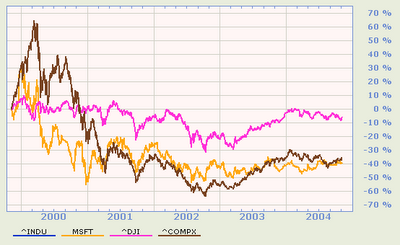Debunking the Dot Com Bubble and Clinton Economy Myths
Unfortunately, the stock market analysts do not understand what happened, nor do any polititians, nor most Americans. We have been lead to believe it was a bubble, or anomaly, in the trading that occurred because of a "super heating" economic boom. When one analyzes the facts of the situation, it becomes clear that this didn't happen at all. In fact, the real culprit was behind the scenes incompetence in both the White House, and the Federal Reserve. That's right, President BJ Clinton the Impeached, who gets all the credit for an economy that the great President Ronald Reagan created, is actually the one responsible for that economy's demise. Here's how:
First of all, to understand the basics of the Dot Com Boom, you must understand that what drives the price of stock is demand. In the 1990's, the demand was high for all of these stocks because the economy was robust, and people were saving money. They wanted the best possible return for their money. The price of stocks is limited by what people are willing to pay. There in no way can be a stock whose price is "overvalued" as was said if the stock is actually trading at that price.
Now, in the late 1990's, the economy was so prosperous, then Federal Reserve Chairman Alan Greenspan, an old economy relic, was scared to death of inflation. He saw it happening even though all measures of inflation indicated it was well in check. Steve Forbes was the only economist pointing this out (reference). This prompted a series of preemptive interest rate increases.
At the same time, the Clinton Administration's Attorney General Janet Reno, a partisan political hack slip and fall lawyer, saw monopoly where none was occurring. Her pursuit of Microsoft for "acting like a monopoly" lead to an antitrust lawsuit which ended up in a court decision on April 3, 2000 (reference) stating that Microsoft did violate antitrust laws. If you look at the beginning of April 2000 in the following stock market graph, you will see the immediate results in Microsoft stock (one and a half marks past the beginning of the year 2000).
 Notice that this crash of Microsoft stock (yellow line) had immediate consequences on the NASDAQ index (brown line) which is heavily dependent on Microsoft as well as many other "tech stocks." Thus, the interest rate hikes and the Clinton Justice Department's last illegal hijinks earned us the so called Dot Com Bust, and thus President Bush, elected in November 2000 and taking office in January 2000 inherited the Clinton Recession.
Notice that this crash of Microsoft stock (yellow line) had immediate consequences on the NASDAQ index (brown line) which is heavily dependent on Microsoft as well as many other "tech stocks." Thus, the interest rate hikes and the Clinton Justice Department's last illegal hijinks earned us the so called Dot Com Bust, and thus President Bush, elected in November 2000 and taking office in January 2000 inherited the Clinton Recession.What's more, look at Al Gore's mark on the recession. His election stealing antics led to a sharp drop in the more volatile markets (November - December 2000). Notice the sharp increase when President Bush took over. See the sharp increase also when Bush signed the tax cuts (June 2001)? Also, note the sharp decline in all markets in 9-11-2001. The markets then suffered another blow in the endless rounds of so called weapons inspections and diplomacy leading up to the Iraq War (2002 - 2003), but increased after we finally went to war, which was the only solution to dealing with a madman.
